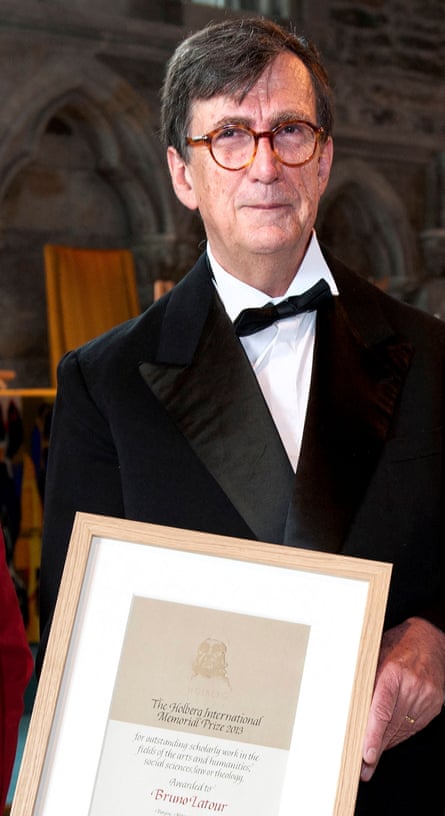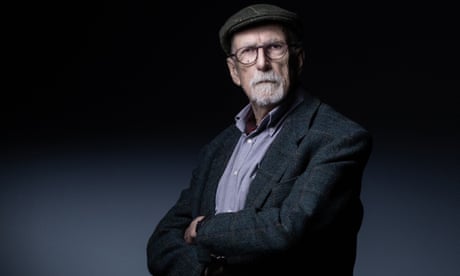Little Bruno was encouraged to work in the vineyards. “I was always terrible,” he recalled of his work in the fields. “So I shifted to philosophy.”
His most incendiary and compelling book was entitled Où Atterrir?, published in English translation as Down to Earth, in 2018. In it Latour asks us to imagine the captain of a plane telling their passengers: “Ladies and gentlemen, we are in a holding pattern … There is nowhere to land right now. No available runway; no safe harbour.” This was an allegory – crises of migration, inequality and environment are linked by a politics of denial: we finally have an environmentally based politics, but it’s one of negation – hence Brexit, Trump’s wall, Matteo Salvini’s refusal of Mediterranean refugees in Italy, the UK’s policy of shipping refugees to Rwanda. 
Termites should be our role models, Latour argued, because they do not lay waste to the Earth, nor are any of them insect Elon Musks who seek to relocate to another planet. “That is escapist,” Latour said. “But when you think in terms of a critical zone, you are locked in, you cannot escape.” By that key term, “critical zone”, he meant a space between two and three kilometres thick “above and below the surface of the Earth. But all discovered life is within it.”
With the rise of alternative facts, he argued, whether or not a statement is believed depends far less on its veracity than on the conditions of its “construction” – that is, who is making it, to whom it’s being addressed and from which institutions it emerges and is made visible. Latour did not produce our post-truth age, but foresaw how it could arise.
He is survived by his wife and children.
Latour denied he was a relativist, but rather that he was drawing attention to how day-to-day lab research worked. It was hardly a progression towards unveiling facts or truth but a disorderly mass of observations, inconclusive results and fledgling theories that were systematically erased when research results were presented as facts. What Sokal failed to grasp, Latour argued, is that “facts remain robust only when they are supported by a common culture, by institutions that can be trusted, by a more or less decent public life, by more or less reliable media”.
Though ill from pancreatic cancer, Latour was active in his last months. His final book, Mémo sur la Nouvelle Classe Écologique, soon to be published in English and co-written with the Danish sociologist Nikolaj Schultz, posits that ecology is the new class war and implies that growth fetishists such as Liz Truss and Emmanuel Macron are on the wrong side of it. “They still believe in the idea of an old-fashioned modernised planet,” said Latour. They and their ilk should have learned the lesson that growth, pursued by means of gas, coal and oil, was what he called a “betrayal”.
In this, Latour’s thought betrayed the influence of his family, Burgundian winemakers for generations. His critical zone was, like viticultural terroir, something to be nurtured rather than exploited to death. “What does it mean for politics if we are locked in, and not in the infinite cosmology opened by Galileo?” he asked. It means we cannot just endlessly extract resources and discard our waste. In the critical zone, we must maintain what we have, because it is finite, local, at risk and the object of conflict.
Many artists and thinkers have found Latour’s thinking inspiring. “He is adamantly against silo-thinking, looking instead at interconnectivity and intermingling,” said the artist Olafur Eliasson. The nature writer Robert Macfarlane found appealing Latour’s notion of a “new climatic regime”, “in which social justice and ecological crisis must be recognised as aligned, and short-term interest must be subordinated to long-term survival”. The sociologist Richard Sennett has described Latour simply as “the most creative intellectual of our generation”.
The experience on this study encouraged Latour to break from the positivist view of science as uncovering universally valid truths about the world. This view was confirmed when he was invited by the French biologist and future Nobel laureate Roger Guillemin to study at his laboratory at the Salk Institute in San Diego, California. The result of these observations was Latour’s first book, with the British sociologist Steve Woolgar, Laboratory Life: The Construction of Scientific Facts (1979), which argued that scientific knowledge is an embodied cultural practice that needs institutions, peers, journals, money and instruments to produce objective facts. “Some scientists were very shocked because they said I was debunking science by showing what it needs as a social institution.” Latour’s views led him, to put it mildly, to take up some interesting positions: he once argued, for instance, that the pharaoh Ramesses II could not have died of tuberculosis, because no such disease was known at the time.
His ideas were profoundly influenced by the Gaia theory of the maverick British scientist James Lovelock, wherein the Earth is a self-regulating organism. Latour’s sense was that it is the critical zone, rather than the whole of our planet, that should be the object of human concern and care, in order to reverse the despoiling impact of what he and others called the Anthropocene, the epoch in which humanity has become tantamount to a geological force and presided over the sixth mass extinction event.
Latour was then, avant la lettre, a leader of the anti-growth coalition, but one hopeful that humans might finally learn to live at one with the planet and each other rather than see both as commodities ripe for exploitation. He hoped, for instance, that the recent pandemic, by giving us enforced retreat, might revolutionise how we live, make us collaborate like termites with each other and our environment. Liberating thoughts can travel as fast as Covid, he suggested. “The virus gives us a lesson,” he said in an interview. “If you spread from one mouth to another, you can viralise the world very fast. That knowledge can re-empower us.”
Bruno Latour, philosopher, sociologist and anthropologist, born 22 June 1947; died 8 October 2022
took his ideas out of the academy and for several decades collaborated with his wife, Chantal (nee Drouet), a musician and feminist campaigner whom he married in 1970, his daughter, Chloe, an actor and director, and his son, Robinson, a writer and director, on a variety of performance-cum-lectures that toured Europe.
The New York Times in 2018 described Latour as the most famous and least understood of French philosophers. Arguably that was because his work spanned many disciplines at a time when such cross-pollination was out of fashion. He was, Le Monde has pointed out, also sometimes misunderstood in France, where his disparate interests deluded some into believing that his ideas were not coherent.
But his big idea, developed in more than 20 books, theatrical performances and art installations, as well as his 2013 Gifford Lectures in Edinburgh, entitled Facing Gaia, was not that difficult to grasp. We should realise we are not the selfish individuals predicted by neo-liberal economic theory, but social beings living interdependently with other organic life, and that, like his favourite insects, we must productively recycle our waste and consume little.
Latour was born, the youngest of eight children, in Beaune in Burgundy, into a family that have been wine-growers since the 17th century. “Our burgundy is supposed to be the best,” he said once. “My father was always surprised that people in other countries produce wine. He couldn’t understand why there was wine in Australia or California or Chile. It seemed to him a waste of time. I only drink our wine, in fact. Not bordeaux – just burgundy! I’m not a relativist, you see.”
He went to the University of Dijon to study philosophy in 1966, developing the views that would exasperate Sokal. He doubted from early on scientists’ self-image as logical, objective truth seekers. After graduation he avoided military service by heading to the Ivory Coast. In Abidjan he completed his PhD and taught philosophy at a technical school. There he did a study to find out why French companies had trouble recruiting competent black executives in postcolonial Ivory Coast. He found that black students were taught only abstract theories and when, later, they were unable to understand technical drawings, this was ascribed to them having premodern African mentalities. “It was clearly a racist situation,” he said, “which was hidden behind cognitive, pseudohistorical and cultural explanations.”


